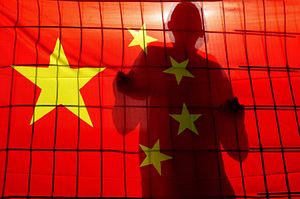With fingers firmly in ears, China issued its traditional reaction to the U.S. “Country Reports on Human Rights Practices for 2013” on Friday. Showing a deep, willful misunderstanding of even the term human rights, China continues to dodge all international criticism on the subject of its own internal human rights abuses.
While the original U.S. report was not discussed much in China, the PRC’s response is being plastered everywhere—ironically illustrating China’s most vulnerable area of human rights, i.e. China’s brutal and harrowing strangulation of any attempts at a free press. Two editorials issued by Xinhua, China’s official news organization, had tough words for the U.S., degenerating quickly into name-calling. One editorial stated, “Ironically, the long-time braggart human rights preacher has not acceded to key UN human rights conventions on the rights protection of children, women and the physically challenged.”
The response from China has at least been succinct: the U.S. is a bunch of “hypocrites” and China’s image is the victim. While this may be true in essence, it is far from it in scope. While China hit with gun control and, of course, PRISM—a PRC perennial favorite—the problems China faces are large and are not helped by the government’s bloody-mindedness regarding all human rights criticisms—from repression in Xinjiang to the lack of an independent judiciary. Even the normally stoic Reuters had a bit of fun with this: “The report, without a hint of irony in acknowledging China’s sprawling domestic security and intelligence apparatus, took the United States to task for spying on its own citizens.” International organizations the world over rank China at the bottom of many of their rights lists, but the U.S. takes most of the blame in the PRC, with an editorial in Xinhua claiming China is “a longtime victim of the U.S.’s groundless accusations.”
The U.S. list is issued for informative and legislative reasons, and comments on the human rights situation in nearly 200 countries—few of which complain. The nearly 30,000 word report on China is inevitably followed, every year, by a similar Chinese report on the U.S. human rights situation—which is then trumpeted by every state media publication in the country.
With their highly publicized rejection of the U.S. human rights report this year, no quarter was given in the Middle Kingdom’s onslaught, accusing the U.S. of being “braggarts,” “unfair” and “hypercritical” and the report of being “based on phoney and biased evidence.” Funnily enough, China’s report often relies on—and could not exist without—reports from Western media organizations, many of which are blocked by the country’s increasingly absurd Great Firewall which bans everything from Twitter to The Guardian.
The previously mentioned editorial, headlined “U.S. should ‘sweep its own doorstep’ on human rights” also stated, “The U.S. report deliberately ignored the great progress China has made in human rights.” This is untrue, as mentions were made in the State Department report of the abolition of the reeducation through labor and the fact that China’s tenuous “developing country” status allows it some leeway. China is adamant this year in its assumption that nations with human rights abuses should not comment on those of other countries, a somewhat dubious statement considering China’s recent lobbying and success at attaining a seat on the UN Human Rights Council.
China’s vehement rejection of this list comes as outgoing U.S. Ambassador to China Gary Locke famously exited with mention of the human rights situation in China. Locke said, “As a permanent member of the U.N. Security Council that has hosted the Olympics and sent a spacecraft to the moon, China should have the national self-confidence to withstand the media scrutiny that most of the world takes for granted.” And, while it may be true that reports such as those issued by the State Department on human rights hurt China’s image, it can not possibly be as nearly as damaging as China’s response.

































